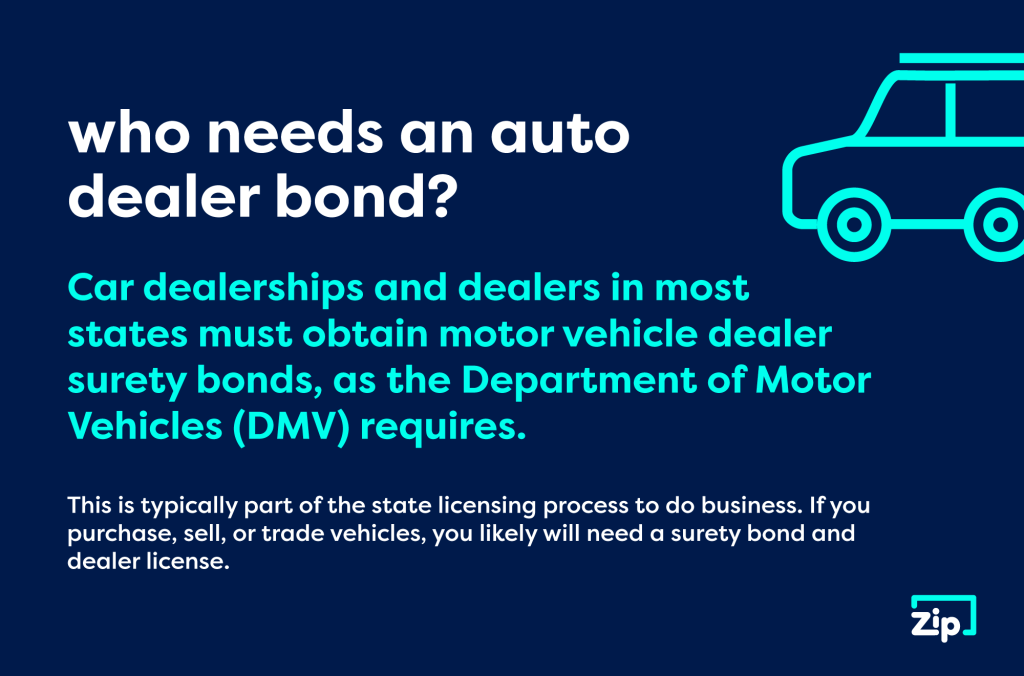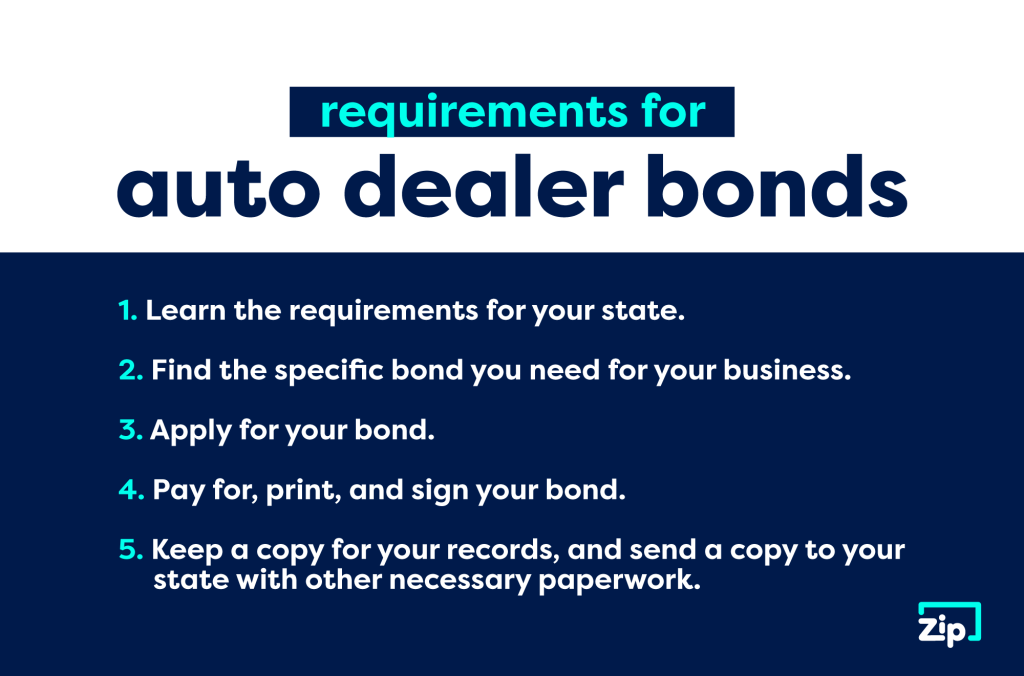
What is an auto dealer bond?
Before someone can obtain a motor vehicle dealer license, they must post a surety bond that ensures compliance with industry regulations. An auto dealer bond is a type of license and permit bond. You may see it described using different names, depending on your state. Here are a few of them:
- Car dealer bond
- Auto broker bond
- Motor vehicle dealer bond
- Auto bond
- Auto dealer surety bond
- Dealer bond
These bonds are legal contracts to protect consumers against unethical business practices. They help hold dealerships accountable to industry and state regulations.
Get Your Auto Dealer Bond:
Quick Takeaways
- Before someone can get a license, they must obtain a motor vehicle dealer surety bond that ensures compliance with industry regulations.
- A customer can file a claim if a dealer commits fraudulent, unethical, or other unlawful business activities.
- Used auto dealer bonds, new auto dealer bonds, wholesale dealer bonds, and mobile home dealer bonds are four types of auto bonds.
- You could pay as little as 1% of the total bond amount as your annual premium.
How much does an auto dealer bond cost?
The cost of your auto dealer bond will depend on your state and the required bond amount. If you have excellent credit, you could pay as little as 1% of the total bond amount as your annual premium. For example, if your state requires a $50,000 bond, you might pay $500 annually.
In general, the higher your personal credit score, the lower your bond premium will be. If you’ve experienced claims in the past, that could also impact the cost. However, if your surety provider sees you’re low risk (with good personal and business financials), they may issue the bond instantly.
How does an auto dealer bond work?
Auto dealer bonds help protect customers and the Department of Motor Vehicles (DMV) from dealerships and their employees. They may also protect financial institutions and the state from potential financial loss.
This surety bond connects three different parties:
- Principal: The auto dealer or dealership that needs the bond
- Obligee: The state DMV requiring the bond
- Surety: The company providing the bond
A customer or the state can file a claim if a dealer commits fraud or unethical/unlawful business activities. If the claim is valid, the surety may cover the claimant’s losses up to the total bond amount. The dealer will then need to pay back the surety for the damages.
Who needs an auto dealer surety bond?
Car dealerships and dealers in most states must obtain motor vehicle dealer surety bonds, as the Department of Motor Vehicles (DMV) requires. This is typically part of the state licensing process to do business. If you purchase, sell, or trade vehicles, you likely will need a surety bond and dealer license.
Motor Vehicle Dealer Definition
A “motor vehicle dealer” is an individual or business entity engaged in the business of buying, selling, or exchanging motor vehicles. The definition can vary by jurisdiction, but typically, motor vehicle dealers include those involved in selling new or used cars, trucks, motorcycles, and other types of vehicles.

Different Types of Auto Dealer Bonds
Some of the most common types of auto bonds include:
- Used auto dealer bonds
- New auto dealer bonds
- Wholesale dealer bonds
- Mobile home dealer bonds
- Motorcycle dealer bonds
- Auto dealer manufacturer bonds
The bond you need will depend on your state and the type of vehicle you want to sell.
Auto Dealer Bond Requirements
To successfully apply for and obtain a motor vehicle dealer surety bond, follow these five steps.
1. Learn the requirements for your state.
Each state may have distinct regulations and criteria for auto dealer bonds, so familiarize yourself with the necessary steps and documentation for compliance.
2. Find the specific bond you need for your business.
Different states may have various bond types, such as motor vehicle or used car dealer bonds. Select the correct bond type that aligns with your specific dealership activities.
3. Apply for your bond.
This typically involves submitting an application to a surety bond provider (like ZipBonds). The application process may require you to provide information about your business, financial history, and other relevant details. Upon approval, you’ll receive your bond.
4. Pay for, print, and sign your bond.
After approval, fulfill the payment requirements associated with the bond. Once you’ve submitted payment, you’ll receive the bond document. Print a physical copy of the bond and ensure it’s signed as required. This signed document signifies your commitment to adhering to the terms and conditions outlined in the bond agreement.
5. Keep a copy for your records, and send a copy to your state with other necessary paperwork.
Retain a copy of the signed bond for your records. Simultaneously, submit a copy of the bond to the relevant state authorities and any other necessary paperwork. This step is essential for completing the licensing process and demonstrating compliance with state regulations.

How to Get an Auto Dealer License in Your State
Here’s the general process for applying for an auto dealer license. Be sure to check your specific requirements, as they vary from state to state.
- Research state requirements: Familiarize yourself with the specific licensing requirements set by your state DMV or other licensing agency.
- Attend required training (if applicable): Check if your state mandates attendance at a dealer license seminar or training and fulfill this requirement.
- Establish a business entity: Establish a legal business structure for your dealership, adhering to state regulations.
- Secure a business location: Obtain a physical business location that meets zoning requirements and has space for an office and vehicle display.
- Obtain a sales tax number: Get a sales tax number from your state’s revenue or taxation department for collecting and remitting sales taxes.
- Purchase insurance: Obtain required insurance coverage, including liability insurance, and provide proof as part of your license application.
- Secure an auto dealer bond: Obtain a bond as a financial guarantee for ethical operation and compliance with regulations.
- Complete the license application: Fill out the auto dealer license application, including all necessary documentation.
- Undergo background checks: Be prepared for background checks for yourself and key personnel involved in the dealership.
- Pay fees and submit application: Pay the required fees and submit your application online or in person to the state licensing agency.
- Await approval: Allow time for the state to process your application and conduct necessary reviews, background checks, and inspections.
- Receive your auto dealer license: Upon approval, the state will issue your auto dealer license. Display it prominently at your dealership and maintain ongoing compliance with state regulations.
Other Frequently Asked Questions
Credit history helps sureties determine an applicant’s likelihood to trigger a bond claim. Some bonding companies may approve you for an auto dealer bond if you have a poor credit score, while others may not. If you’re approved, the cost of your bond may be higher than if you had excellent credit.
A state’s Department of Motor Vehicles (DMV) usually regulates auto dealer licensing and bonding.

How to Get an Auto Dealer Bond in Your State
ZipBonds is the fastest and most secure way to get the bond you need. We take out the pain of long, complicated applications. Many of our bonds are approved and processed immediately. Get your auto dealer bond today by applying below – or call us directly at (888) 435-4191. We’d be happy to walk you through the process!
About ZipBonds.com
Founders Ryan Swalve and Zach Mefferd formed the vision for ZipBonds.com when they realized how overly complicated it was to help clients place surety. The frustration of being unable to incorporate the technology they’d used in other insurance-focused projects left them thinking “there has to be a better way.”
Fast forward a couple of years, and that better way is the impetus of everything we do at ZipBonds. We constantly look for innovative ways to improve the bonding process for our clients and agents. Our team comprises individuals who understand all angles of surety – for companies, agencies, and individuals. Incorporating everyone’s point of view to improve the process while simultaneously integrating cutting-edge technology is what sets our business apart.

